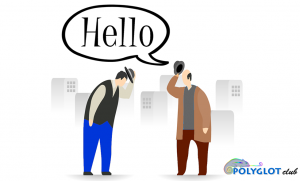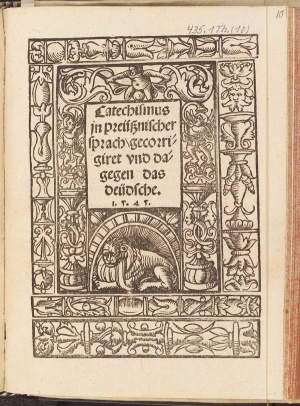Difference between revisions of "Language/Prussian/Vocabulary/How-to-Say-Hello-and-Greetings"
< Language | Prussian | Vocabulary
Jump to navigation
Jump to search
m (Quick edit) |
|||
| (One intermediate revision by the same user not shown) | |||
| Line 12: | Line 12: | ||
If you’re planning a trip to the country or are trying to learn Prussian, keep reading to discover some of the most important greetings. | If you’re planning a trip to the country or are trying to learn Prussian, keep reading to discover some of the most important greetings. | ||
Let’s get started! 🤗 | |||
<span link>Consider exploring these related pages after completing this lesson:</span> & [[Language/Prussian/Vocabulary/Days-of-the-week|Days of the week]]. | |||
__TOC__ | __TOC__ | ||
==Greetings== | ==Greetings== | ||
| Line 66: | Line 67: | ||
===The Sound of the Baltic Prussian language (Numbers, Phrases & Sample Texts)=== | ===The Sound of the Baltic Prussian language (Numbers, Phrases & Sample Texts)=== | ||
<youtube>https://www.youtube.com/watch?v=VcgwVNMp_hE</youtube> | <youtube>https://www.youtube.com/watch?v=VcgwVNMp_hE</youtube> | ||
==Sources== | ==Sources== | ||
| Line 106: | Line 106: | ||
[[Category:Jennifers]] | [[Category:Jennifers]] | ||
==Other Lessons== | |||
* [[Language/Prussian/Vocabulary/Days-of-the-week|Days of the week]] | |||
<span links></span> | |||
Latest revision as of 12:25, 27 March 2023
🤗 Prussian Greetings for Everyday Life
Hi Prussian learners! 😃
Do you want to learn how to say “Hello” in Prussian?
Old Prussian was a Western Baltic language which was once spoken by the Old Prussians, the Baltic peoples of the Prussian region. The language is called Old Prussian to avoid confusion with the German dialects of Low Prussian and High Prussian.
Greetings are an important part of any language because they allow you to connect and communicate with others.
If you’re planning a trip to the country or are trying to learn Prussian, keep reading to discover some of the most important greetings.
Let’s get started! 🤗
Consider exploring these related pages after completing this lesson: & Days of the week.
Greetings[edit | edit source]
| English | Prussian |
|---|---|
| general greeting spoken in the Samlandian dialect of Poland | Kaīls |
| morning greeting spoken in the Samlandian dialect of Poland | Kaīls anksteīnai |
| how are you? | Kāi ēit di? |
| how are you? | Kāi tebbei ēit di? |
| how are you? | Kāi tū gīwa? |
| welcome greeting spoken to a man | Kaīls pergūbuns |
| welcome greeting spoken to a woman | Kaīls pergūbusi |
| welcome greeting spoken to a group of people | Kaīls pergūbusis |
| Good evening! | Labban bētan! |
| Good night! | Labban nakts! |
| Goodbye! | Ērdiw! / Deiwūtiskan! |
Videos[edit | edit source]
The Sound of the Baltic Prussian language (Numbers, Phrases & Sample Texts)[edit | edit source]
Sources[edit | edit source]
Free Prussian Lessons[edit | edit source]
Language Exchange[edit | edit source]
Forum[edit | edit source]
Tools[edit | edit source]
Marketplace[edit | edit source]
Other Lessons[edit | edit source]

